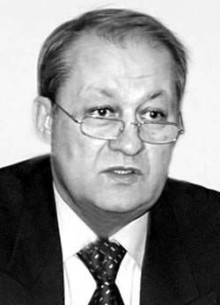The European Commission’s vice-president Gunter Verheugen declared in a recent interview with Die Welt that all European countries will have joined the EU in 20 years except the countries of the post-Soviet space: Russia, Georgia, Moldova, Belarus, and Ukraine. A wide debate on various aspects of Ukraine’s European integration has unfolded on the pages of The Day. Below we offer another opinion.
Naturally, it won’t do to view Verheugen’s statement in absolute terms; he was not officially entitled to make any such statements. On the other hand, the fact remains that such conclusions reflect real (objective) processes underway in the EU and, as such, should be treated by the Ukrainian political community with serious attention and realism.
The key issue here is the EU’s economic hardships stemming from the implementation of the Lisbon strategy that envisages not only a substantial acceleration of economic dynamics but also the assured leadership of the competitive European economy over the next 10 years. However, even now the fiasco of these plans is clear. The EU has recently turned into a zone with the lowest economic growth rate. The EU is noticeably lagging behind the US in financing research and innovative projects, and in the rate of GDP growth; these have dropped almost to the 2 percent level (2.2% in 2005). This is 1.6 times less than in the US. In 2005, the GDP grew by 1.4 percent in France and the UK, and only by one percent in Germany. EU expansion has not only failed to allay the problem but worsened it in many respects.
Apparently no economic system can be stable without a political foundation. Without such a foundation the European Union’s foreign political and defense effectiveness is also impossible. The process of adopting the EU constitution began with an eye to precisely these considerations; the constitution was meant to provide the legal foundations for the assertion of a political Europe, thus breathing new life into the Union, and to substantially enhance the competitiveness of the European integration model.
However, events in the middle of last year in France and the Netherlands, linked to the blocking of the constitutional process, demonstrated the discrepancy between the goals of forming a solid supranational political Europe and EU expansion. Suffice it to remember that most of the residents who voted against the constitution explained their stand by the EU’s “excessive expansion.” The main theme was “there is getting to be too much of Europe, and its upkeep is costing too much.”
It is also impossible to ignore last year’s tragic events in France, which became known as the “migrant revolution,” revealing the depth of antagonisms in the formation of a new social stratum, the “proletariat of the 21st century, on the basis of migrant strata of the population on the European territories.” There is a logical connection between these events and the “cartoon scandal,” which bears the hallmarks of civilizational confrontations.
These and other processes explain the EU’s extremely cautious attitude to its further development. Thus, Verheugen’s admonition should be regarded as corresponding to these processes. It is also necessary to bear in mind the considerable economic and technological lag of post-Soviet countries that have a claim to EU membership, including Ukraine. According to the average statistical per capita GDP rate, Ukraine is four times below EU countries.
This necessitates a more balanced approach to determining Ukraine’s foreign political course. The objective conditionality of a possible postponement to a more distant time of the deadline for realizing the ultimate goal, Ukraine’s full membership in the EU (our invariable aspiration), should not be a loss for society, since what is at stake here is the extension of the period of fundamental systemic transformations that must be carried out. Moderate politicians thus realize that deepening constructive cooperation within the SES framework, particularly with Russia, is Ukraine’s serious asset also in the context of European integration prospects. We must go toward the West with an effective state, competitive economy, and mature national identity.
In the foreign political domain Ukraine must consider the possibilities of corrections to the EU European integration strategy, linked with the formation of an all-European economic area, “Greater Europe,” i.e., a Europe that includes not only Western, Central, and Eastern Europe but also Russia and other post-Soviet countries. This project is quite realistic; a nucleus of EU countries in the center of Europe with concentric circles comprising countries at various integration depths. It is about diversification of the European integration process, making it more flexible.
A dialogue on this project has been underway for several years on the EU-Russia level. Ukraine must not keep aloof from this dialogue. Moreover, in the presence of good will it would be possible to discuss the possibility of a Russia-EU-Ukraine geopolitical triangle; at this stage it could serve as the basis of a new pan-European strategy. It would be erroneous to assume that such a structure would somehow impede the realization of our main objective, full EU membership, even if in the long run.
There is another subtext. Europe is our common home, one for all the peoples that inhabit the continent. Therefore, we must all be concerned about its destiny and future. In this sense monopoly on the part of a single country or group of countries is inadmissible. This would be discriminatory. We must not agree to this.







